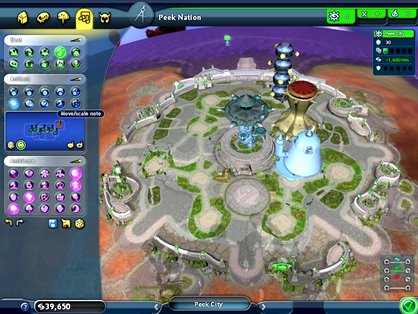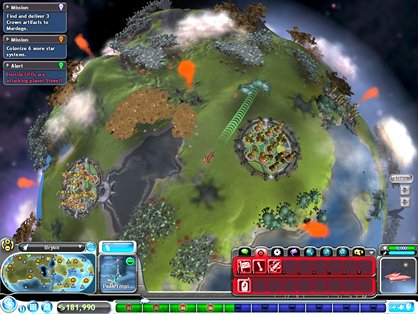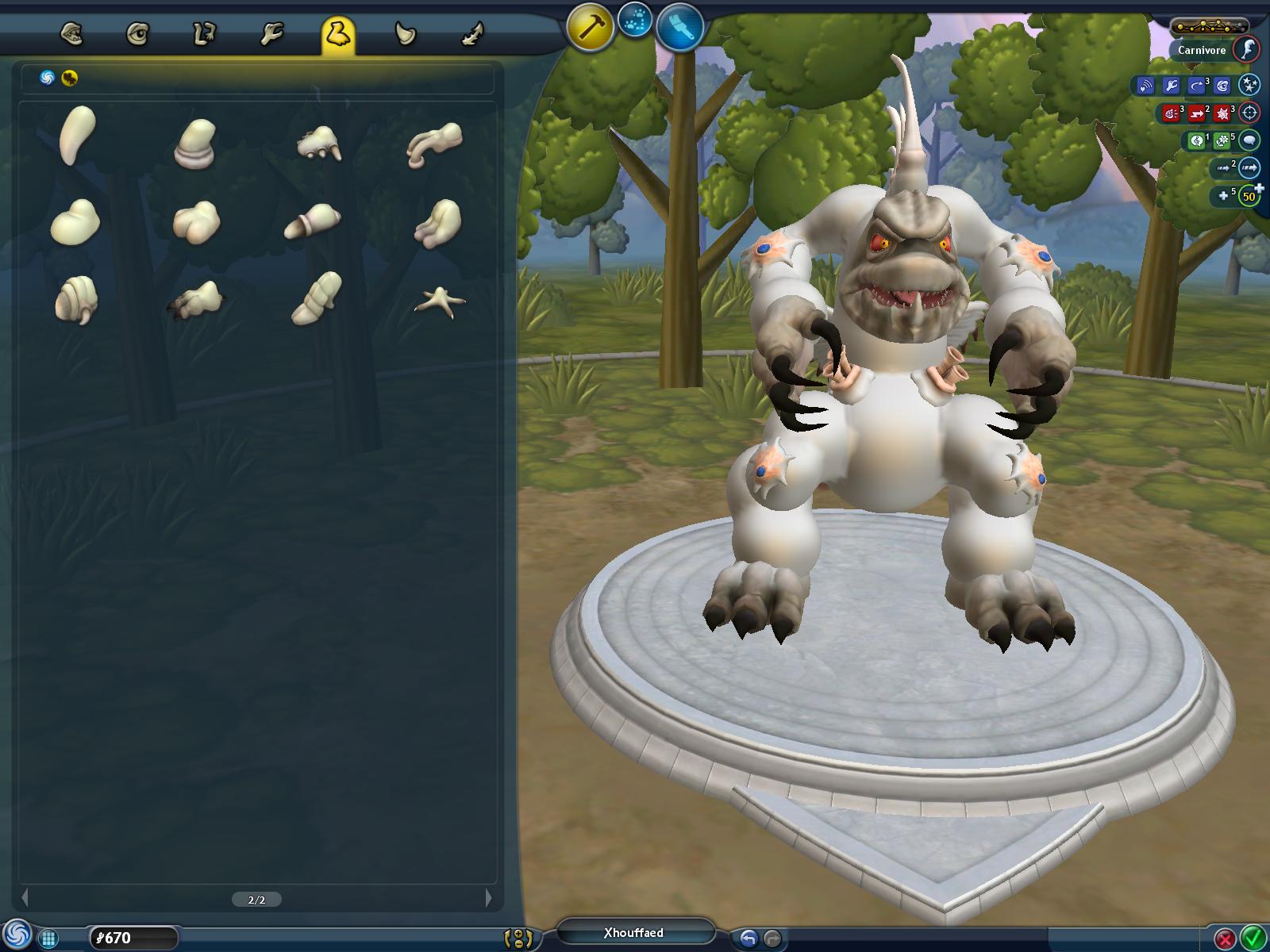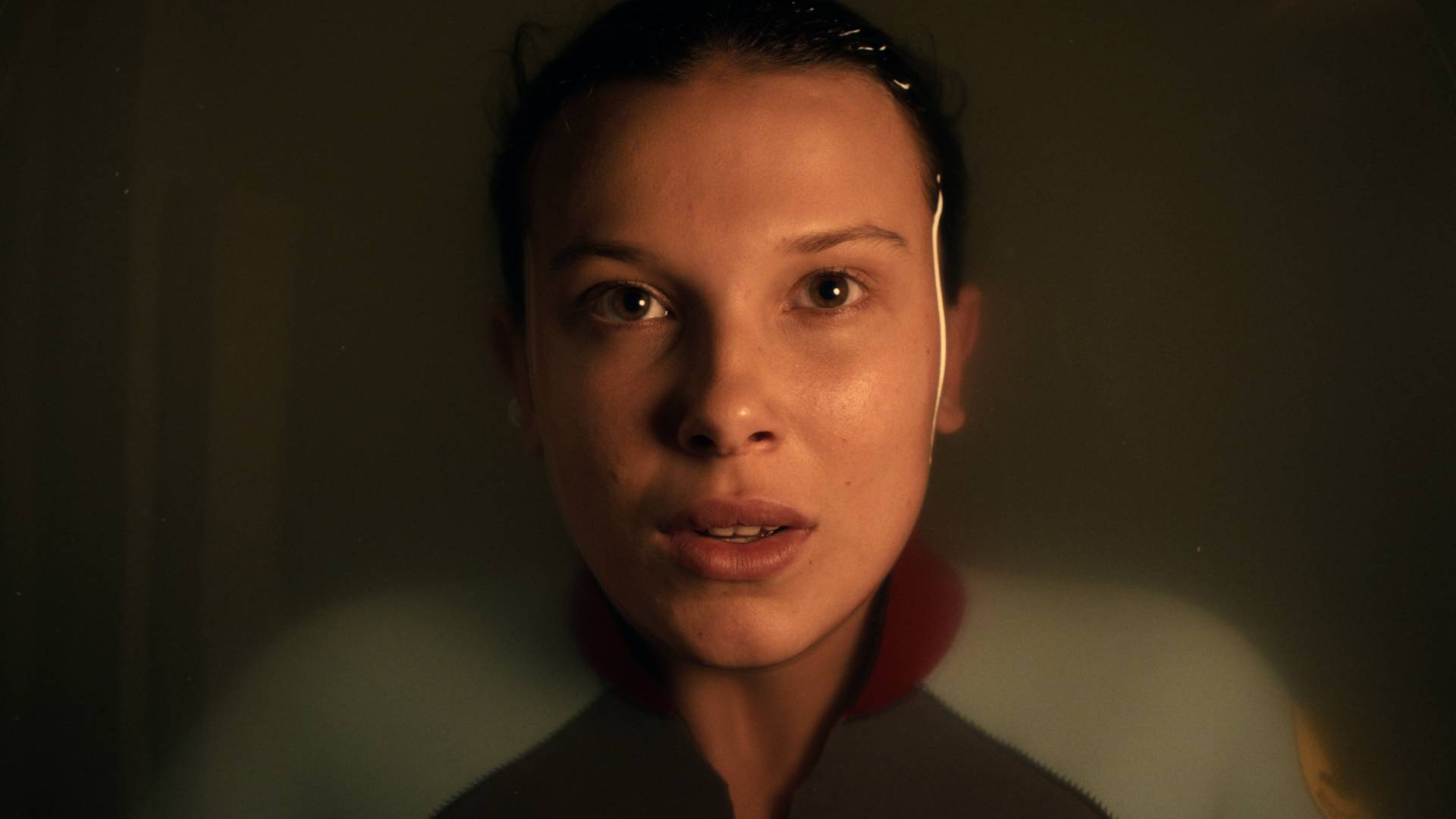Why you can trust GamesRadar+
WHERE IT ALL GOES RIGHT
Are you still reading, Will, or have you grown tired of my complaints and decided to spend a few entertaining minutes with the old Russian space-shuttle console in your office? I can dig that—I’d spin those dials every day, too—but just so you know, I’m done with the complaining, because there’s so very much to enjoy in Spore. Like the fact that it’s such a sensually pleasing game. The “undersea” setting in Cell phase is vibrant with primary colors and lively sounds. In Creature phase, animals run through lush jungle environments and leap in the waves offshore. Spaceships buzz your little enclave in Tribe phase, just like you’ll buzz other tribes in the Space phase. And of course, there’s the constant discovery of astounding-looking new creatures, from walking flower-pots to a head-on-legs that’s apparently modeled after your very own (head, I mean—not legs). It’s all very alive and random-feeling, making for a game world that’s full and stimulating. And the audio is tops—I thoroughly enjoyed the music throughout, and I killed a good 45 minutes creating my tribe’s anthem in the surprisingly robust Anthem creator tucked away in the Civilization phase.

Above: The Anthem creator is cheaper than a drum set and less likely to piss offthe neighbors
I’m also pretty sure that you’re working in a building full of comedians over there at Maxis, because Spore is funny—not trying-too-hard funny, but actually funny, in subtle ways. When your single-celled creature swims past eerily huge enemies in Cell phase, your microscopic predators are rendered with all the size and menace of Godzilla. There’s the sassy lounge music and hubba-hubba dance that goes down when you mate in the Creature phase. The first time I saw my Tribe do the Mexican hat dance around their fire, I went bananas (and then made them do it again, like 10 times in a row). When I zoomed in on cities in the Civilization phase, I found citizens engaging in activities that made sense depending on their cultural traits—the military Tastykakes city was full of creatures executing little armed services drills. Even the ways other people’s creations are integrated gave me regular laughs—my biggest ally in most of the Space phase was the Box on Legs empire, and in that same phase, the dialogue trees and sing-song cadence of other aliens are actually laugh-out-loud funny. Ask the PC Gamer staff—I’ve been imitating it for them nonstop, and I think they love it!
(Please don’t actually ask them if they love it.)
In fact, the Space phase is my favorite part of Spore, probably because it’s where I finally experienced the “oh, wow” reaction to its scope that I’d been waiting for since I first saw you demonstrate its Powers of Ten–like construction—beginning so very small, then pulling back to reveal something larger, and then again and again and again—a few years ago. I couldn’t believe that every dot blinking in the galaxy represented explorable star systems of planets playing home to flora, fauna, civilizations, and collectible items—and that at any time, I could decide which, if any, of those things to pursue. On my first play-through, I focused on collecting rare items that I could sell (and earn achievements for finding) and planet-sculpting tools. Then I decided to re-focus on expanding my empire by allying with other civilizations (I wasn’t feeling like a conqueror at the time) and planting new colonies. Then I started a new game and pursued it with the single-minded goal of reaching the center of the galaxy.

I know that the center-of-the-galaxy trip is actually Spore’s one story line, complete with an endgame, but I absolutely love the fact that playing it is no more or less a legitimate way of spending your time in Spore than doing any of the other things I was doing. Whether you’re playing “the game” from start to finish or just noodling around in the Cell phase, you’re still getting something great out of it. That freedom—to play as you wish without penalty—may be Spore’s most significant strong suit, and it’ll probably be the reason I keep playing it in spite of its repetitive aspects. The depth of the achievement system doesn’t hurt, either: I can tell there’s a lot of incentive there to try out different ways of playing (See how many planets you can visit!
Weekly digests, tales from the communities you love, and more
See how many alliances you can form! See how many creatures you can build!) and win badges for doing so. And I noticed that even the achievements have achievements—as you play, you can unlock new lists of stuff to unlock.
That’s very meta, Will.
More info
| Genre | Strategy |
| Description | SimCity creator Will Wright is creating his most ambitious simulation ever: one for the entire universe. |
| Platform | "PC","Xbox","PSP","DS","PS2","Xbox 360","PS3","Wii" |
| US censor rating | "Everyone 10+","Everyone 10+","Everyone 10+","Everyone 10+","Everyone 10+","Everyone 10+","Everyone 10+","Everyone 10+" |
| UK censor rating | "Rating Pending","Rating Pending","Rating Pending","Rating Pending","Rating Pending","Rating Pending","Rating Pending","Rating Pending" |
| Alternative names | "Spore Creatures (DS)" |
| Release date | 1 January 1970 (US), 1 January 1970 (UK) |



